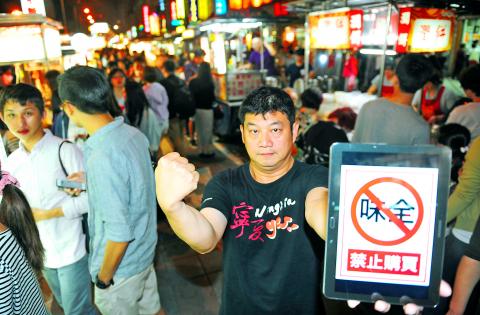The government promised yesterday to “do all it can,” including toughening laws and punishing “black-hearted” entrepreneurs, to restore people’s confidence in the nation’s food safety system.
In response to the second open letter by “an angry citizen,” who published their complaint in the form of a front-page Apple Daily advertisement, the Executive Yuan said that it “will absolutely not evade its responsibility and will keep making efforts endlessly.”
The angry citizen, in their letter titled “Letter to Premier Jiang Yi-huah (江宜樺),” accused the government led by Jiang and President Ma Ying-jeou (馬英九) of failing to ease people’s concerns over food safety since the “toxic starch” scandal in May last year, in which Uni-President Enterprises Corp was involved, but escaped unscathed.

Photo: Lo Pei-der, Taipei Times
A series of food safety scandals have continued to rock the nation and its neighboring countries, including October last year’s “black-hearted oil” incident, in which copper chlorophyll was found in adulterated edible oil.
The two top government leaders’ response to the scandal was also published in yesterday’s issue of the Chinese-language Apple Daily, in which Ma said: “It only hurts our feelings, not our bodies,” and Jiang said: “Like every one of you, I’m worried about food safety, so in my home, we use only imported olive oil.”
“The responses from both of you to these incidents have flabbergasted the public, hurting not only their feelings, but also their physical health,” the citizen said.
The citizen went on to accuse the government of not doing enough to punish law-breaking businesspeople and not alleviating people’s concerns about food safety in Taiwan.
The citizen expanded their complaints to the government’s missteps over the past few years in terms of economic development, social order, labor rights and information security.
In response, Executive Yuan spokesperson Sun Lih-chyun (孫立群) yesterday said the government is as worried about food safety and other issues as the general public.
“The Executive Yuan has speedily introduced eight measures to combat the food safety scandals, including increasing fines imposed on culprits, hiking cash rewards for those alerting the authorities and establishing a hotline for public tipoffs,” Sun said.
The other five measures are beefing up controls of all oil products, managing the recycling of used oils, enforcing the existing three-layer quality control system, tracking the sources and manufacturing processes for all food items and reforming the goods manufacturing practice system for the food industry.
Sun said the government has not finished its crackdown on illegal manufacturers.
“We’ve been referring all suspected businesses to the relevant authorities, based on the evidence collected thus far,” Sun said.
“We will pursue all law-breaking cases to the end, bringing justice to all, no matter how big the suspected conglomerates are and how big a share they enjoy of the consumer market,” he said.
Admitting that there will be “pains” during the crackdown, Sun said: “The government is determined to set Taiwan’s food industry on a new track and restore people’s confidence in food safety.”

Chinese Nationalist Party (KMT) Chairman Eric Chu (朱立倫), spokeswoman Yang Chih-yu (楊智伃) and Legislator Hsieh Lung-chieh (謝龍介) would be summoned by police for questioning for leading an illegal assembly on Thursday evening last week, Minister of the Interior Liu Shyh-fang (劉世芳) said today. The three KMT officials led an assembly outside the Taipei City Prosecutors’ Office, a restricted area where public assembly is not allowed, protesting the questioning of several KMT staff and searches of KMT headquarters and offices in a recall petition forgery case. Chu, Yang and Hsieh are all suspected of contravening the Assembly and Parade Act (集會遊行法) by holding

PRAISE: Japanese visitor Takashi Kubota said the Taiwanese temple architecture images showcased in the AI Art Gallery were the most impressive displays he saw Taiwan does not have an official pavilion at the World Expo in Osaka, Japan, because of its diplomatic predicament, but the government-backed Tech World pavilion is drawing interest with its unique recreations of works by Taiwanese artists. The pavilion features an artificial intelligence (AI)-based art gallery showcasing works of famous Taiwanese artists from the Japanese colonial period using innovative technologies. Among its main simulated displays are Eastern gouache paintings by Chen Chin (陳進), Lin Yu-shan (林玉山) and Kuo Hsueh-hu (郭雪湖), who were the three young Taiwanese painters selected for the East Asian Painting exhibition in 1927. Gouache is a water-based

Taiwan would welcome the return of Honduras as a diplomatic ally if its next president decides to make such a move, Minister of Foreign Affairs Lin Chia-lung (林佳龍) said yesterday. “Of course, we would welcome Honduras if they want to restore diplomatic ties with Taiwan after their elections,” Lin said at a meeting of the legislature’s Foreign Affairs and National Defense Committee, when asked to comment on statements made by two of the three Honduran presidential candidates during the presidential campaign in the Central American country. Taiwan is paying close attention to the region as a whole in the wake of a

OFF-TARGET: More than 30,000 participants were expected to take part in the Games next month, but only 6,550 foreign and 19,400 Taiwanese athletes have registered Taipei city councilors yesterday blasted the organizers of next month’s World Masters Games over sudden timetable and venue changes, which they said have caused thousands of participants to back out of the international sporting event, among other organizational issues. They also cited visa delays and political interference by China as reasons many foreign athletes are requesting refunds for the event, to be held from May 17 to 30. Jointly organized by the Taipei and New Taipei City governments, the games have been rocked by numerous controversies since preparations began in 2020. Taipei City Councilor Lin Yen-feng (林延鳳) said yesterday that new measures by